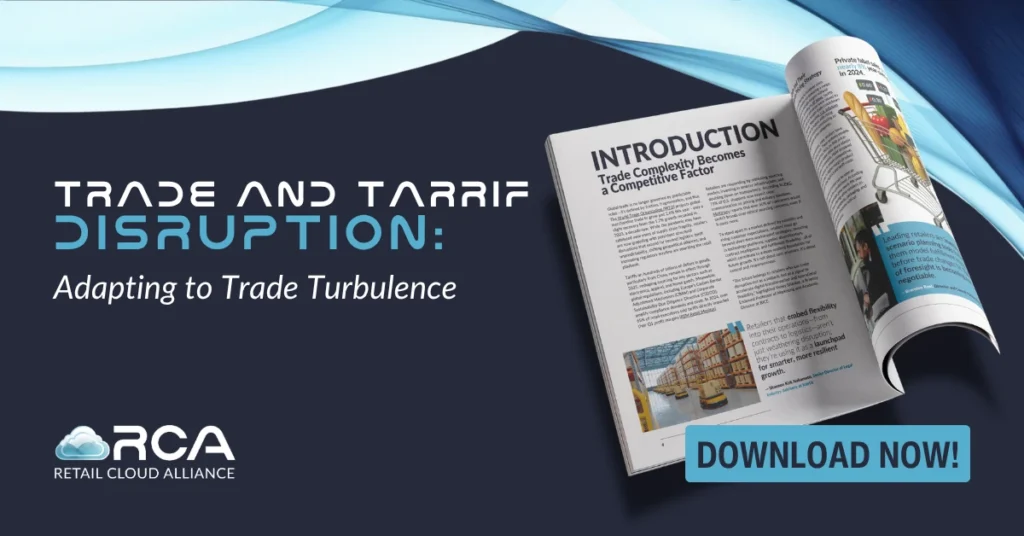

Tariffs and Trade Disruption:
How Retailers Can Build Adaptive Supply Chains
Global trade is in flux. Tariffs are rising, supply chains are fragmenting, and regulatory demands are tightening. For retailers, the old playbook of low-cost sourcing no longer works. The winners in 2025 will be those who can pivot faster—embedding adaptability into sourcing, pricing, and fulfillment to turn disruption into competitive advantage.
Developed in collaboration with RCA partners, this report explores how shifting tariffs and trade policy are reshaping retail strategies. Featuring insights from leading experts, it reveals how retailers are building adaptive supply chains and future-ready operations.
Download the Report

Insights to Strengthen Sourcing, Pricing and Fulfillment
What does it take to thrive in an era defined by volatility? This report breaks down the defining challenges—from tariff unpredictability to nearshoring—and uncovers how retailers are designing flexibility into their contracts, pricing, and fulfillment models. Discover actionable insights to strengthen supply chains, offset rising costs, and leverage technology for smarter, faster decision-making.
Key Takeaways
Tariffs Reshape Sourcing
Retailers are rethinking sourcing as tariffs drive up costs and create new risks. “China + 1” and nearshoring strategies are helping diversify production, reduce dependency, and speed replenishment.
Fulfillment Gets Flexible
Global shipping delays and customs slowdowns are pushing retailers toward regional fulfillment models. Multi-node warehousing and automation are making it possible to respond faster to demand while cutting costs.
The New Pricing Equation
Trade disruption and inflation are forcing retailers to rethink pricing. Dynamic pricing, private label growth, and scenario planning tools are balancing rising costs with consumer expectations for fairness and transparency.
Contracts as Compliance Tools
Contracts are no longer passive documents—they’re becoming active tools for risk management. AI-enabled platforms embed ESG, labor, and tariff requirements into operations, reducing disruption and boosting accountability.
Insights from Industry Leaders
This report features expertise from retail strategists, supply chain innovators, and technology leaders who are shaping how businesses navigate global trade disruption. With perspectives from Kyndryl, Icertis, Spieckerman Retail, and leading academics, you’ll uncover proven strategies to adapt sourcing, pricing, and fulfillment models—and build supply chains that are ready for whatever comes next.

Heather Fox
Vice President, U.S. Consumer and Travel, Kyndryl
Heather Fox helps global retailers build adaptable operations through hybrid-cloud infrastructure and digital transformation. At Kyndryl, she leads strategies that connect procurement, logistics, and finance in real time, enabling retailers to pivot faster in the face of trade disruption and shifting supply chains

Shannon Kirk Nakamoto
Senior Director, Legal Industry Advisory, Icertis
Shannon Kirk Nakamoto specializes in contract lifecycle management, helping retailers embed ESG, tariff, and compliance requirements directly into their agreements. Her work empowers retail leaders to reduce risk, improve vendor accountability, and transform contracts into strategic tools for growth.

Carol Spieckerman
President, Spieckerman Retail
Carol Spieckerman is a retail analyst and strategist who advises companies on sourcing, brand development, and market positioning. She provides fresh perspective on how tariffs, trade policy, and global regulations are reshaping vendor relationships and retail decision-making.

Venky Shankar
Brierley Endowed Professor of Marketing and Academic Director, BICE
Venky Shankar is an internationally recognized scholar and advisor in retail strategy and marketing. His research and thought leadership help retailers understand how to turn trade disruption into competitive advantage by balancing cost, agility, and long-term resilience

Brandon Rael
Director and Consult Partner, Kyndryl
Brandon Rael works with retailers worldwide to implement predictive planning and scenario modeling tools. His expertise helps businesses anticipate trade-related disruptions, optimize fulfillment strategies, and strengthen operational resilience before challenges strike.